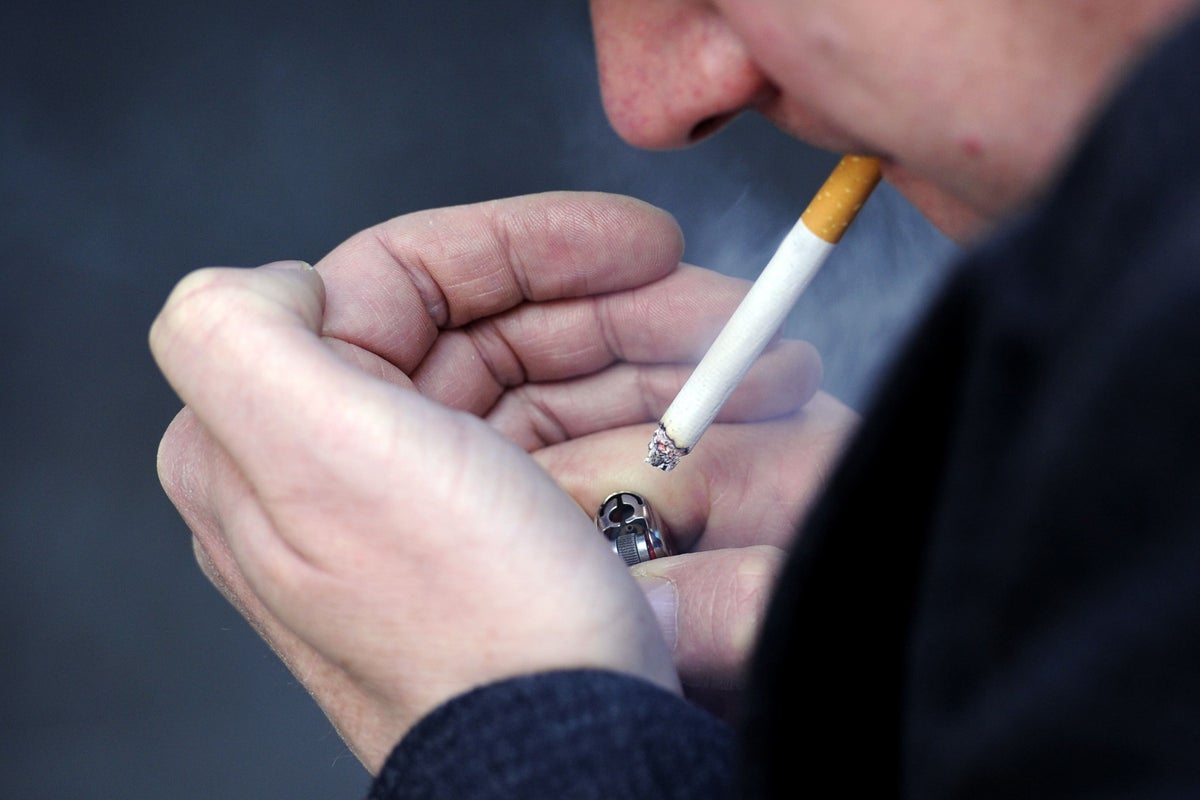
“Meagre” public spending on tobacco control measures should be propped up by a “polluter pays” tax on tobacco firms, a group of health experts said.
A new letter signed by leading health charities and medical Royal Colleges said current spending is only “around a quarter of the investment needed” to help the Government achieve its smoke-free ambition.
A package of measures aimed at driving smoking rates down below 5% by 2030 was introduced by ministers last week.
Tobacco has been the root cause of around eight million deaths in the last 50 years and is estimated to be responsible for 75,000 a year in the UK alone— Professor Dame Helen Stokes-Lampard
They include encouraging people to swap tobacco products for vapes, offering up to £400 to pregnant women to stop smoking and cracking down on the illegal sale of vapes to under-18s.
But ministers ruled out raising the minimum age to buy cigarettes from 18.
In an opinion piece published in The BMJ, the experts said the announcements are a “step forward” but “meagre” spending on tobacco control could cost the economy billions.
They said the cash to prop up the projects comes from a reallocation of current Department of Health and Social Care (DHSC) funds rather than “new money”.
“If government is unwilling or unable to find the funds from the public purse, there is cross party support for a ‘polluter pays’ levy on the tobacco industry,” the letter says.
It says a major review into smoking – known as the Khan review – called for £125 million per year to be invested into tobacco control.
“The ministerial announcements last week are a step forward … but are only around a quarter of the investment needed and represent a re-allocation of existing DHSC funds to public health, rather than new money,” the authors add.
The measures announced last week will help to reduce smoking rates but they are nowhere near enough— Professor Nick Hopkinson
“Capping net profit margins on UK tobacco sales from what they are currently, around 50%, to no more than 10%, in line with the average for UK manufacturing, could bring around £700 million a year directly into the DHSC.
“This would be enough to fund the comprehensive tobacco control measures in the Khan report five times over.”
The experts said the public largely supports a levy on the tobacco industry to pay for the Government’s smoke-free ambition.
One signatory, Professor Nick Hopkinson, chairman of Action on Smoking and Health, said: “The measures announced last week will help to reduce smoking rates but they are nowhere near enough.
“Our letter is a clear demand from health leaders for Government to fully and immediately fund the measures needed to achieve a ‘Smokefree 2030’.
“If the money can’t be found from the public purse, a polluter pays levy that caps the tobacco industry’s ill-gotten profits must be introduced – an approach supported not just by health experts but by three quarters of the public, and with strong cross-party support in parliament.”
Another, Professor Dame Helen Stokes-Lampard, chairwoman of the Academy of Medical Royal Colleges, added: “The sustainability of the NHS depends on a strong prevention strategy.
“The announcements designed to reduce smoking rates are of course a constructive step forward, but will deliver only around a quarter of the investment recommended by the Government’s own independent review, and in reality just represent a re-allocation of existing DHSC funds to public health, rather than any new resources.
“This is unacceptable at a time when health budgets are under increasing strain due to inflation.
“Tobacco has been the root cause of around eight million deaths in the last 50 years and is estimated to be responsible for 75,000 a year in the UK alone.
“There is no place for excuses from Government, which needs to go further and faster when it comes to tackling smoking once and for all.”
A Department of Health and Social Care spokesperson said: “We are committed to achieving our ambition of a smoke-free 2030 and are backing this with significant funding.
“Last week we announced up to £58 million over the next two years as part of new plans to cut smoking rates and tackle youth vaping.
“This is on top of £68 million from the public health grant which was given to local stop smoking services last year, with a further £35 million committed to the NHS so that all smokers admitted to hospital are offered NHS-funded tobacco treatment services.
“One of the most effective ways of stopping someone smoking tobacco is making it too expensive to buy and we routinely increase cigarette duties year on year.”
Simon Clark, director of the smokers’ lobby group Forest, said: “With smoking rates at their lowest recorded levels, funding anti-smoking initiatives during a cost-of-living crisis is not justifiable, nor is it a good use of taxpayers’ money.
“A so-called polluter pays levy would undoubtedly be passed on to the consumer, punishing smokers for their habit, and forcing many more to buy their tobacco from the unregulated black market, with a subsequent loss of revenue for government.”
– The letter has been signed by officials from Action on Smoking and Health; Academy of Medical Royal Colleges; Royal College of Physicians; Royal College of Psychiatrists; Royal College of General Practitioners; Royal College of Obstetricians and Gynaecologists; Faculty of Public Health; British Medical Association; Royal College of Midwives; Royal College of Nursing; Centre for Ageing Better; Association of Directors of Public Health; The Health Foundation ; British Heart Foundation; Cancer Research UK; Spectrum public health research consortium and Asthma and Lung UK







